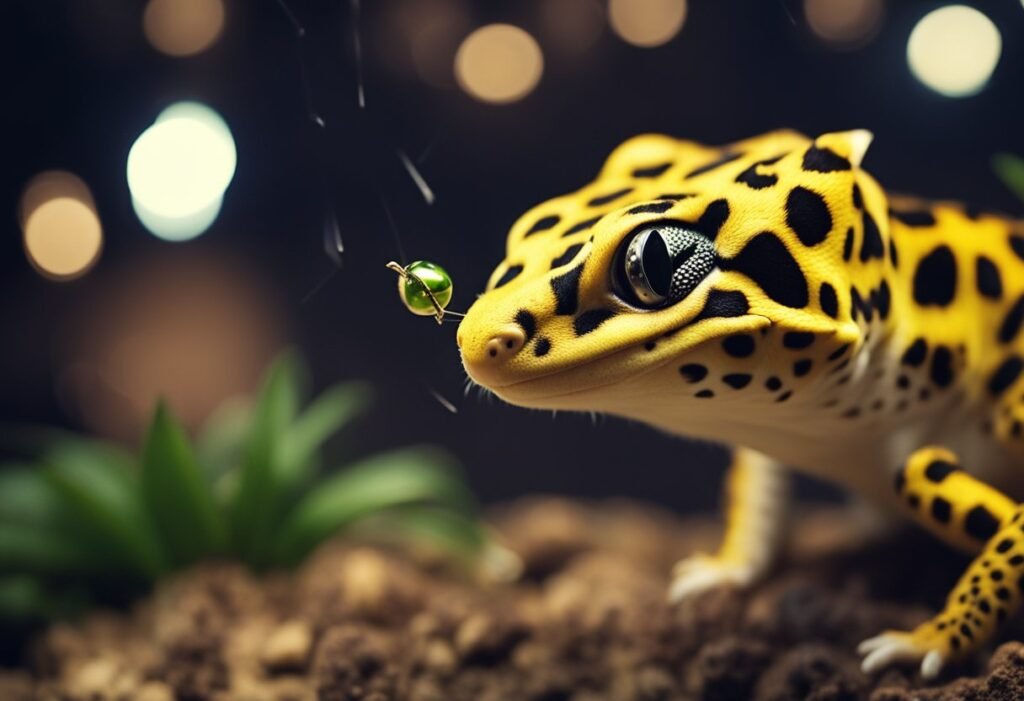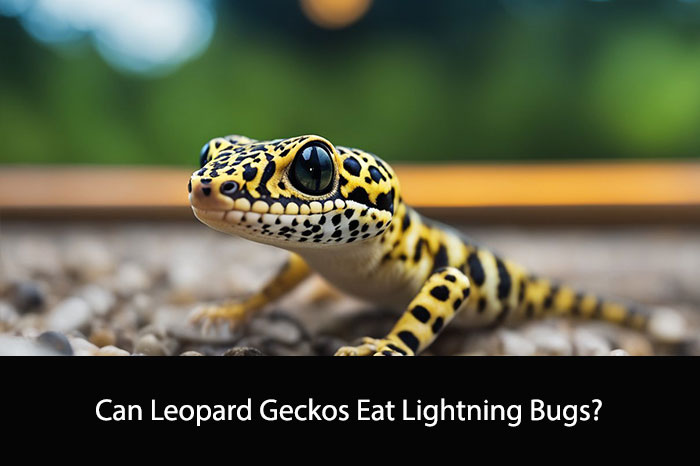Leopard geckos are fascinating creatures that make great pets. Owners of these reptiles often wonder what types of insects they can feed to their pets. One question that frequently comes up is whether or not leopard geckos can eat lightning bugs.
While lightning bugs, also known as fireflies, may seem like a tempting treat for your leopard gecko, it is important to know whether or not they are safe to eat. Leopard geckos are insectivores and require a diet that is high in protein. However, not all insects are suitable for their consumption. Some insects can be toxic or harmful to leopard geckos, and it is important to know which ones to avoid. In this article, we will explore whether or not lightning bugs are safe for leopard geckos to eat and provide some important information to help you make an informed decision about feeding your pet.
Leopard Gecko Dietary Basics

Nutritional Requirements
As responsible pet owners, we must ensure that our leopard geckos receive a balanced diet to maintain their health and well-being. Leopard geckos are insectivores, meaning they primarily eat insects. In the wild, they consume a variety of insects such as crickets, mealworms, and waxworms. In captivity, their diet can be supplemented with other insects such as roaches, silkworms, and superworms.
Leopard geckos require a diet that is high in protein and low in fat. They also need a source of calcium and vitamin D3 to maintain healthy bones. Calcium can be provided through supplements or by feeding them insects that are dusted with calcium powder. Vitamin D3 can be obtained through exposure to UVB lighting.
Feeding Habits
Leopard geckos are crepuscular, meaning they are most active during dawn and dusk. They are opportunistic feeders and will eat whenever food is available. It is recommended to feed adult leopard geckos every other day and juveniles daily.
When feeding leopard geckos, it is important to provide them with appropriately sized prey. The size of the prey should be no larger than the width of the gecko’s head. Feeding them prey that is too large can cause impaction, a potentially fatal condition where the gecko’s digestive system becomes blocked.
In conclusion, providing a balanced and varied diet is crucial for the health of our leopard geckos. Feeding them appropriately sized prey and supplementing their diet with calcium and vitamin D3 will help ensure they live a long and healthy life.
Lightning Bugs as Prey

When it comes to feeding leopard geckos, it’s important to provide them with a varied diet that includes a range of insects. One insect that some owners may consider offering their geckos is the lightning bug, also known as the firefly. However, before adding this insect to your gecko’s diet, it’s important to consider both the potential risks and benefits.
Toxicity Concerns
One of the main concerns when it comes to feeding leopard geckos lightning bugs is their toxicity. Lightning bugs produce a chemical called lucibufagins, which can be toxic to some animals, including birds and mammals. While there is limited research on the effects of lucibufagins on leopard geckos specifically, it’s generally recommended to avoid feeding them lightning bugs as a precaution.
Nutritional Content
In addition to the potential toxicity concerns, it’s also important to consider the nutritional content of lightning bugs. While they do contain some nutrients that are beneficial for leopard geckos, such as protein and fat, they may not be the best choice for a staple food item. This is because they are relatively low in calcium, which is an essential nutrient for leopard geckos.
Overall, while lightning bugs may seem like an interesting and potentially nutritious addition to your gecko’s diet, the potential risks associated with their toxicity make them a less than ideal choice. Instead, we recommend sticking to a varied diet of other insects that are known to be safe and nutritious for leopard geckos, such as crickets, mealworms, and dubia roaches.
Safe Feeding Practices

Prey Selection
When feeding leopard geckos, it is important to choose appropriate prey items. We recommend feeding them insects that are safe and nutritious for them to consume. Some safe options include crickets, mealworms, and dubia roaches.
It is important to avoid feeding them insects that are toxic or harmful to their health. One such insect is the lightning bug, which contains a toxic compound called lucibufagins. Feeding leopard geckos lightning bugs can cause serious health problems, and even death.
Feeding Frequency
Leopard geckos are nocturnal animals and typically feed at night. We recommend feeding adult leopard geckos once every two to three days, while juvenile leopard geckos should be fed every day. It is important not to overfeed them, as this can lead to obesity and other health problems.
When feeding, it is important to monitor the amount of food consumed by the leopard gecko. We recommend feeding them an appropriate amount of insects based on their size and weight. Overfeeding can cause digestive problems and other health issues.
In conclusion, it is important to choose safe prey items and feed leopard geckos an appropriate amount to ensure their health and well-being. By following these safe feeding practices, we can ensure that our leopard geckos live happy and healthy lives.
Alternatives to Lightning Bugs
If you’re looking for alternatives to feeding your leopard gecko lightning bugs, there are a variety of options available. In this section, we’ll explore some commercial diet options as well as live prey varieties that you can consider.
Commercial Diet Options
One option for feeding your leopard gecko is to use commercial diets. These diets are designed to provide a balanced and nutritious meal for your gecko, without the need for live prey. Some popular options include:
- Repashy Superfoods Gecko Diet
- Pangea Fruit Mix Complete Gecko Diet
- Zoo Med Natural Adult Bearded Dragon Food
When choosing a commercial diet, it’s important to read the label and make sure that it contains all the necessary nutrients for your leopard gecko. You may also want to consider offering a variety of different diets to keep your gecko interested and engaged.
Live Prey Varieties
If you prefer to feed your leopard gecko live prey, there are a variety of options available. Here are a few to consider:
- Crickets: Crickets are a popular live prey option for leopard geckos. They are readily available at most pet stores and are a good source of protein.
- Mealworms: Mealworms are another popular option. They are easy to keep and can be purchased in bulk.
- Dubia Roaches: Dubia roaches are a nutritious option that are becoming increasingly popular among leopard gecko owners.
When feeding your leopard gecko live prey, it’s important to make sure that the prey is appropriately sized for your gecko. You should also avoid feeding wild-caught insects, as they may carry parasites or diseases.
Health Implications
Digestive Health
Leopard geckos are insectivorous and require a diet that is high in protein. While lightning bugs may seem like a tasty treat, they are not a suitable food source for leopard geckos. Lightning bugs contain toxins that can cause digestive issues in leopard geckos. Consuming lightning bugs can lead to an upset stomach, diarrhea, and dehydration.
Potential Risks
In addition to digestive issues, consuming lightning bugs can also pose other risks to leopard geckos. The toxins found in lightning bugs can cause neurological issues, muscle tremors, and even death in some cases. It is important to note that even if a leopard gecko does not show any immediate signs of illness after consuming lightning bugs, the long-term effects of repeated exposure to these toxins are not yet fully understood.
It is recommended that leopard gecko owners avoid feeding their pets lightning bugs and stick to a diet of commercially available insect feeders that are safe and nutritionally balanced. If you suspect that your leopard gecko has consumed a lightning bug, it is important to monitor them closely for any signs of illness and consult with a veterinarian if necessary.
Owner Responsibilities

As an owner of a leopard gecko, it is our responsibility to ensure that our pet is healthy and happy. This includes providing a suitable habitat, feeding them a balanced diet, and monitoring their health regularly.
Habitat Maintenance
Leopard geckos require a specific type of habitat to thrive. It is our responsibility to provide them with a suitable enclosure that meets their needs. This includes providing a proper substrate, temperature gradient, and hiding places.
We should also ensure that their enclosure is clean and free from any harmful substances or objects. Regular cleaning and disinfecting of the enclosure is essential to prevent the buildup of harmful bacteria.
Regular Health Checks
It is important to monitor our leopard gecko’s health regularly. We should observe their behavior and appetite, and check for any signs of illness or injury. Regular health checks can help us identify any potential health issues early on, and seek proper treatment if necessary.
We should also take our leopard gecko to a veterinarian who specializes in reptile care for regular check-ups and preventative care. This can help ensure that our pet remains healthy and happy for years to come.
In conclusion, as owners of leopard geckos, it is our responsibility to provide them with a suitable habitat and monitor their health regularly. By doing so, we can ensure that our pets remain healthy and happy for years to come.
Frequently Asked Questions
Are lightning bugs safe for leopard geckos to consume?
No, lightning bugs are not safe for leopard geckos to consume. They contain a toxin called lucibufagins, which can be harmful to your pet.
What insects are recommended as part of a leopard gecko’s diet?
Leopard geckos are insectivores and require a diet consisting mainly of insects. Crickets, mealworms, and dubia roaches are commonly recommended as part of their diet.
Can leopard geckos have a varied diet including fruits and vegetables?
Leopard geckos do not require fruits and vegetables as part of their diet. In fact, they may have difficulty digesting them. It is best to stick to a diet consisting mainly of insects.
Is it possible for leopard geckos to eat earthworms or hornworms without harm?
Earthworms and hornworms are safe for leopard geckos to consume in moderation. However, they should not make up the majority of their diet as they are not as nutritionally balanced as other insects.
How can I prevent my leopard gecko from overeating?
Leopard geckos are known to overeat, which can lead to health problems. It is important to feed them the appropriate amount of insects based on their size and age. You can also provide a feeding schedule to ensure they are not overeating.
Are there any common insects that leopard geckos should avoid?
Leopard geckos should avoid insects that are too large, such as superworms, as they can cause impaction. They should also avoid insects that are high in fat, such as waxworms, as they can lead to obesity.





